| Srl | Item |
| 1 |
ID:
068723
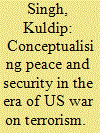

|
|
|
| 2 |
ID:
109729
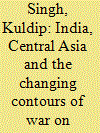

|
|
|
| 3 |
ID:
148561
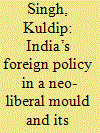

|
|
|
|
|
| Summary/Abstract |
The present paper examines the conduct of India’s foreign policy in neo-liberal paradigm in the post Soviet phase. It looks at forces which resulted in what is called the transition from Cold War era to post Cold War period. It also analyses how Modi Government in search of more intensified engagements with the US, with which its global activism is closely linked, has tried to recast non-alignment. It is argued here that the traditional notion of nonalignment which was seen at odds with close engagements with the US is being shed in a big way though the strategic autonomy is still a key pursuit of India.
|
|
|
|
|
|
|
|
|
|
|
|
|
|
|
|
| 4 |
ID:
136794
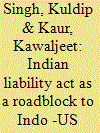

|
|
|
|
|
| Summary/Abstract |
The United States of America while redefining its priorities in South Asia, in post 9/11 phase, when India emerged as a key player, set aside its long standing nuclear policy and signed civil nuclear deal with India. United States persuaded the dissenters, prominent among them being China, to drop their objections within NSG. The then US President Bush and Secretary of the State Condoleeza Rice took keen interest to convince members of NSG for granting exemption to India for enabling it to carryout nuclear commerce with international community.
|
|
|
|
|
|
|
|
|
|
|
|
|
|
|
|
| 5 |
ID:
127516
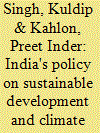

|
|
|
| 6 |
ID:
116037
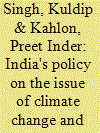

|
|
|
| 7 |
ID:
135145
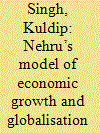

|
|
|
|
|
| Summary/Abstract |
After almost three decades of economic reforms, the tasks Nehru outlined on the eve of India’s independence should be invoked for examining how far these reforms constitute a departure from the Nehruvian model. Putting an end to poverty, ignorance, disease and inequality of opportunities were the key goals Nehru outlined on the eve of India’s independence. Nehru valued these objectives not merely for their instrumental value to economic growth, but for their own sake. However, at the height of India’s drive for liberalisation, the welfare state came to be perceived as a hindrance to the country’s global march. With higher economic growth becoming the ultimate end, the Nehruvian logic of looking at economic development as essential for human welfare was largely abandoned. Economic reforms therefore constituted a departure from the Nehruvian model of economic development. The role of the state for regulating economies is now widely recognised at the global level. This necessitates a re-look at Nehru’s model of economic development.
|
|
|
|
|
|
|
|
|
|
|
|
|
|
|
|
| 8 |
ID:
100395
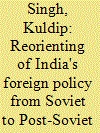

|
|
|
| 9 |
ID:
108198
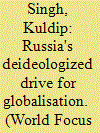

|
|
|
| 10 |
ID:
145356
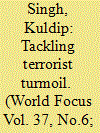

|
|
|
|
|
| Summary/Abstract |
The turmoil of terrorism has been the cardinal concern of world for so long. This got intensified after 9/11 as situation in Afghanistan and neighboring Central Asia had serious security related implications for the region and countries beyond. Now when major exit of US led NATO has happened and Afghan security forces are proving inadequate to the task, such concerns are being revisited. A new dimension has been added in view of IS entering Afghanistan, thus further vitiating the situation of security. However, contrary to this kind of popular view it has been argued here that the move to give responsibility of security to the local forces is a move in the right direction as ultimately this has to be task of the state of Afghanistan. Training and equipping of the Afghan security is the only course as larger political issues beyond immediate security concerns are to be settled by domestic forces.
|
|
|
|
|
|
|
|
|
|
|
|
|
|
|
|